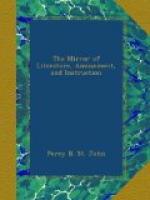Under Hadrian, the Jews were once more excited to a contest.[7] Bar Cochef announced himself as the Messias, but in the sequel 580,000 of our nation were destroyed, and the name of Jerusalem was changed for that of Elia. The emperor Julian, usually called the Apostate, in his ambition for future fame, ordered the Temple of Solomon to be rebuilt. But the fathers of the Christian Church, as well as the contemporary author Ammianus Marcellinus, assert that a fire, which burst forth from the ground, suspended the operation at its commencement.
[7] About fifty years after
the destruction of Jerusalem, when the
great
body of the Jews held the opinion that the time for
the
appearance
of their Messias had arrived, there arose this man,
who
announced himself in that character, and called himself
Bar
Cochef, or the “Son of a Star.” He
was acknowledged by
numbers
of his people, who became his followers, declared him
their
king, and made war upon the Romans, many of whom were
destroyed,
both in Greece and in Africa. His power continued
betwixt
three and four years, when the very people who had
supported
him proclaimed him an impostor, and gave him the
name
Bar Cosifa, or the “Son of a Lie.”
* * * * *
ANATOMY OF SOCIETY.
By J.A. St. John, Esq.
The title of this work leads the reader to expect a regular and connected series of illustrations of the constitution or frame-work of society, in which its scheme might be traced through the various ramifications. On the contrary, we have two volumes of essays of no consecutive interest, but well written, and in some cases abounding with turns of scholarly elegance. They seldom flag, or grow vapid, notwithstanding they are on subjects of common life and experience, upon which moralists have rung the changes of words for centuries past. Occasionally, however, there are some new positions and little conceits which have more of prettiness than truth to recommend them. To call Cowper’s line
God made the country, but man made the town!
“a piece of impious jargon” is no proof of Mr. St. John’s acumen or fair comprehension of the poet’s meaning, but accords with his unproved assertion “The mark of man’s hand is as visible in the country as in the town to all those who make use of their eyes.” Yet this sentiment is a fair specimen of the stern stuff of which Mr. St. John’s creeds and opinions are made up.[8] Nevertheless, the volumes are entertaining, and in proof we have carved out a few laconic extracts:




